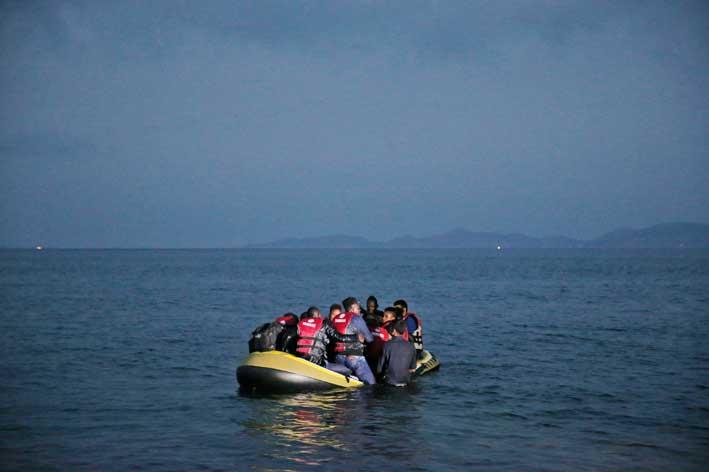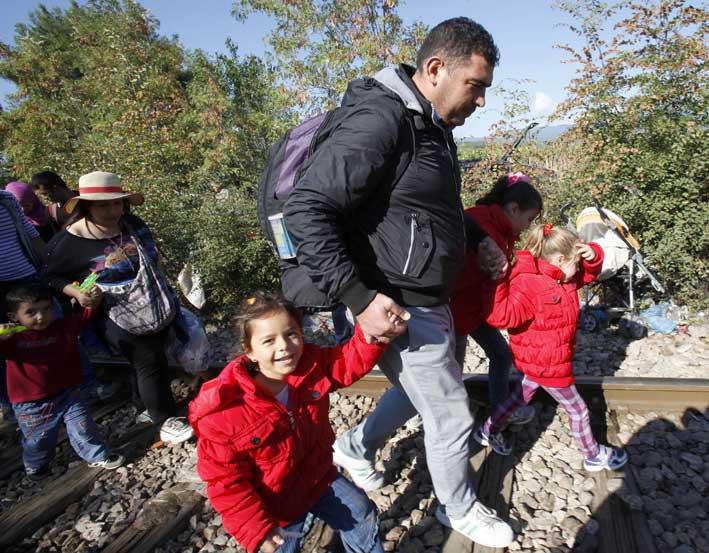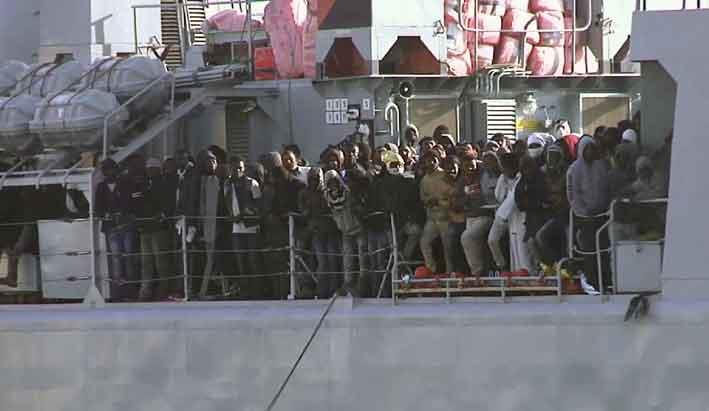At least four countries Friday firmly rejected a European Union plan to impose refugee quotas to ease a worsening migrant crisis that Germany's foreign minister said was "probably the biggest challenge" in the history of the 28-nation bloc.
Hungary, which along with the Czech Republic, Slovakia and Poland said it would not support the proposal, threatened instead to crack down on the thousands of people streaming across its borders daily as they flee war and persecution.
The stance by those Central European countries reflected a hardening front against distributing at least some of the refugees among them and was a stinging rebuff to German Foreign Minister Frank-Walter Steinmeier, who traveled to Prague to try to persuade them to reconsider.

While the Czechs, Slovaks and Poles have been relatively unaffected by the influx, Hungary has faced growing criticism about its stance toward the asylum seekers. Other EU leaders and human rights groups accuse the government of gross mismanagement or serious negligence in housing, feeding and processing themigrants traveling from the Balkans and through Hungary to Western Europe.
Peter Bouckaert of Human Rights Watch asserted Hungary was keeping migrantsand refugees "in pens like animals, out in the sun without food and water."
A video that the rights group said was from inside a holding facility at the border town of Roszke showed metal fences surrounding clusters of tents and dividingmigrants into groups. Guards were depicted throwing food into the air for desperate people to grab.
Erno Simon, a spokesman in Hungary for the U.N. refugee agency, said the housing situation in Roszke with nighttime temperatures falling to near freezing "is really very, very alarming."

Unfazed, Hungarian Prime Minister Viktor Orban threatened an even harder line, saying his country intended to catch, convict and imprison people who continue to penetrate its new border barriers as part of get-tough border security measures scheduled to begin Tuesday.
"If they don't cross into Hungary territory legally, we will consider it a crime," Orban said, saying the "illegal immigrants" had no one to blame but themselves for any hardships suffered.
"They don't cooperate. They are not willing to go to the places where they receive provisions: food, water, shelter, health care. They have risen up against Hungary's legal order," he told a Budapest news conference.
Hungarian police already are overwhelmed with the influx and are unlikely to be able to mount an effective effort to jail those deemed to be entering illegally. Still, Orban's comments were likely to feed the trepidation some of the migrants already were expressing Friday even while still hundreds of kilometers (miles) away from Hungary,
"We heard they are hitting people," said 31-year-old Amer Zein, from the Syrian city of Aleppo, who crossed into Macedonia on Friday. Still, he was determined to push on to Germany with his wife, brother and a friend, despite what he had heard was happening in Hungary.
"We will sit and do whatever the police tell us. We are afraid, but we must get through," he said.
A Hungarian camerawoman who was caught on video kicking and tripping migrantsnear the Serbian border offered a qualified apology Friday.

In a letter in the Magyar Nemzet newspaper, Petra Laszlo said she was "sincerely sorry for what happened," but added: "I was scared as they streamed toward me, and then something snapped inside me."
The 40-year-old was fired by the right-wing N1TV online channel after video of her taken by other journalists went viral. Police released Laszlo without charges after questioning her on suspicion of disorderly conduct. An investigation is continuing, they said.
Bottlenecks have developed at the borders during the crisis as thousands of people, many from war-torn Syria, travel across the eastern flank of Europe.
Reflecting those tensions at the main crossing into Austria, a trickle of migrantsmarching toward Vienna quickly swelled into a torrent early Friday toward a major Austrian highway. Police briefly closed the A4 motorway to Vienna because of the potential dangers posed by people walking on the road.
The trek was sparked by an Austrian Federal Railways decision to suspend train shuttle service for the migrants to Vienna from the Nickelsdorf crossing, citing overcrowding. But Austrian officials later rounded up extra buses and taxis to ferry people to Vienna, along with the three regular trains scheduled from Nickelsdorf.
The shuttle shutdown followed the company's suspension Thursday of all train service toward Vienna from the Hungarian capital, Budapest, where thousands have overwhelmed the main Keleti station to try to board westbound trains.
Only a relatively few people have sought asylum once in Vienna. Instead, the capital has served as a transit point for many arriving in the past week.
Most have gone on to Germany, where 450,000 migrants have entered. It is expecting at least 800,000 this year, the most in Europe. Munich authorities said more than 40,000 people have arrived in the past six days.
Hans Peter Doskozil, the police chief of eastern Burgenland, said 7,500 people had crossed into Austria at Nickelsdorf on Thursday alone.

Steinmeier, the German foreign minister, was in Prague to try to round up support for a plan put forth Wednesday by European Commission President Jean-Claude Juncker to share 120,000 refugees now in Greece, Italy and Hungary among the EU nations.
It will be debated Oct. 8 at an emergency EU interior ministers' meeting. An earlier proposal to share 40,000 other asylum-seekers among EU nations is expected to get the ministers' final approval on Monday.
"No single country can resolve such a challenge alone - we need European solidarity," Steinmeier said.
The International Organization for Migration has put the figure of those arriving in Europe this year at more than 432,000.
The migrant crisis was "probably the biggest challenge for the European Union in its history," Steinmeier said in pressing for the quotas.
But Slovak Foreign Minister Miroslav Lajcak said: "We have a different view," and Hungarian Foreign Minister Peter Szijjarto noted the top goal should be to gain control over the EU's external borders.
"We need to have control over how many (migrants) we are capable of accepting," added Czech Foreign Minister Lubomir Zaoralek. A frustrated Steinmeier subsequently left a news conference with his three counterparts early, allegedly due to a busy schedule.